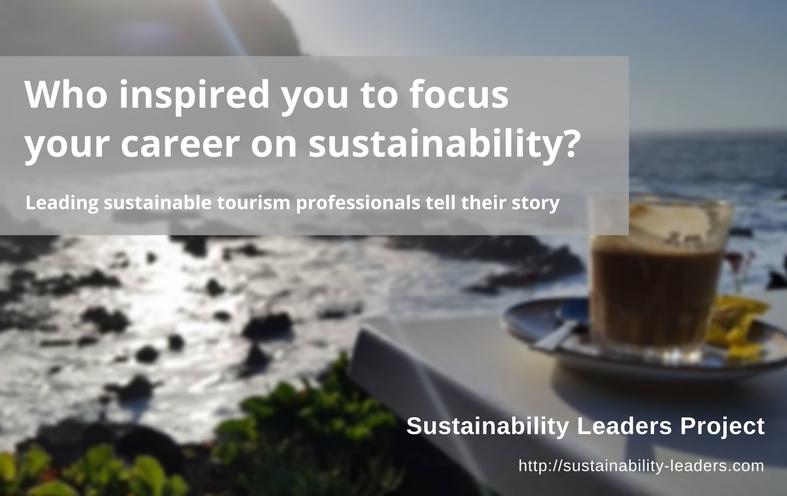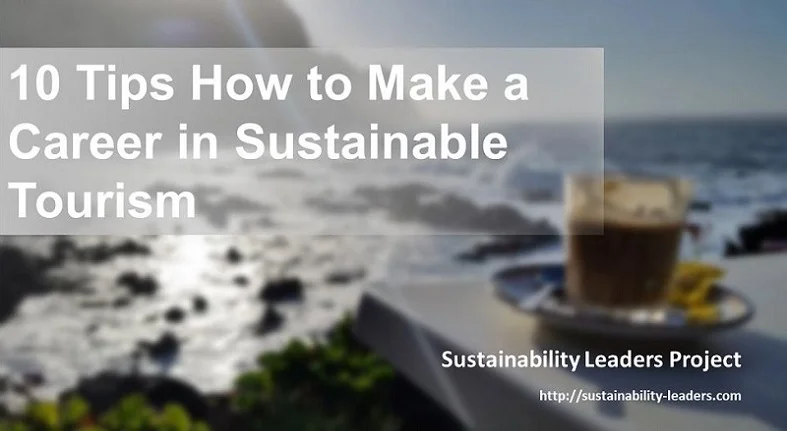
Inspiration is everywhere. Today, there is an endless variety of career choices available in the tourism industry. But among all the possibilities, what makes leaders and changemakers prioritize the sustainable development of tourism over other career choices?
We asked our panel of sustainable tourism specialists what allured them to be in an industry that is at the pinnacle of change. Some of them share their personal encounters, their passion to help society, their love for the environment, and more. Below are their responses (highlighted respondents are available as consultants or speakers).
Some key takeaways:
- Building a fair society is one of the primary reasons. Inequality, economic disparity, social injustice, passive participation of locals are the main concerns which leaders and changemakers wish to address.
- There is a strong desire to improve the livelihoods of locals and to include them in the tourism supply chain.
- Wildlife and nature lovers see the immense potential that tourism has in financing conservation projects and the safeguarding of protected areas and biodiversity.
- Having personally experienced the deterioration of the natural environment or the quality of life of locals.
- Seeing tourism as the perfect platform to preserve cultural heritage, art, and local traditions.

Brian Mullis
Interview | Speaker profile
I have an innate need to create positive impacts on an ongoing basis to achieve some level of equilibrium. To this end, I’ve dedicated my career to balancing the needs of nature, communities and the economy and using tourism as a development tool to encourage the healthy functioning of ecosystems and people’s role within them.
 Jonathon Day
Jonathon Day
Interview | Speaker profile
I have always believed that tourism could be a force for good. I have come to realise that we must work towards that goal, as opposed to believing it will “just happen”.
 Kelly Bricker
Kelly Bricker
Interview | Speaker profile
As an international travel guide and manager for several years, I saw the power of tourism and travel to effect positive change, yet also saw devastating impacts, therefore wanted to learn and research how to use tourism as a tool for effecting positive community and conservation efforts and goals.
Vicky Smith
Interview | Speaker profile
I didn’t really decide or choose it. I would say it chose me. I just knew it was my vocation (in 2001).
Motivation to travel – freedom (helped by a volatile dysfunctional family which made me financially independent, mentally objective, drawn to adventure and brave).
Motivation to work in travel – see the world while earning, gaining experience & enjoying.
Motivation to continue working in travel – great people, down to earth, fun, open, lively.
Motivation to move from mainstream to responsible – witnessing the negative impacts of the mainstream in destinations – people, places, environments, nature – and in corporate culture. Want to make a positive impact but still be able to travel.
Motivation to move to sustainable tourism – too much greenwashing with claims, not evidence.
Motivation to move to transformative/regenerative tourism – Always was my intention, more my nature, holistic including spirituality, I’m a catalyst & generate change, it’s what the world needs, and so is instituted in Agenda 2030.
Aivar Ruukel
Interview
I have been in the tourism business now for 30 years. Sustainability came to my radar by accident, when I started as a young nature tourism entrepreneur and leader of the Estonian ecotourism network. My very first mentor came to be Jan Wigsten, a good friend, and a board member of The International Ecotourism Society of the 1990s. From him, I learned about sustainability and got the first books and articles to read about sustainable tourism.
Alexandra Pastollnigg
Interview
I started because of fairness/social justice. Having thought a lot about “can travel be sustainable at all?” over the past years, I’ve discovered my most fundamental motivation is peace. I believe travel is one of the most powerful tools for personal growth, global awareness building, and uniting humanity—hence one of the most powerful ingredients to world peace. Without peace, we will never have sustainability. And without travel, I do not believe that we can create and maintain lasting world peace.
Ally Dragozet
Interview
My motivations were really about working in an environment I was a specialist in (marine environment) and consulting with an industry I knew well (tourism) where I saw the direct positive impact of my work.
Amine Ahlafi
Interview
The pleasure of assisting to orient an activity towards sustainability by optimizing its positive impacts and minimizing its negative externalities.
Anna Spenceley
Interview
I’ve always been fascinated by nature and wildlife, and have been particularly inspired as a child by documentaries from Sir David Attenborough and the BBC that showcase the beauty and diversity of our planet. Then I had the good fortune to get a place on a Tropical Biology Association course in Uganda’s Kibale forest, and then I took a backpacking tour around some of Kenya and Tanzania’s iconic protected areas – and that sealed it.
I knew then that I wanted to dedicate myself to working on using tourism as a way of generating benefits for local people while financing the conservation of wildlife and protected areas. A masters project in Zimbabwe’s Hwange National Park, a PhD in Kruger National Park and its private game reserves, and a couple of postdocs on top cemented this.
This academic grounding allowed me to move into more of a practitioner role, and I now have incredible opportunities to work with clients and colleagues on a variety of sustainable tourism initiatives across the world. Now I feel humbled that I have the opportunity to work on sustainable tourism issues at a local and international level.
For example, in my voluntary capacity, I have the honour of being the Chair of the IUCN World Commission on Protected Areas (WCPA) Tourism and Protected Areas Specialist Group (TAPAS Group), I sit on the Board of the Global Sustainable Tourism Council (GSTC), and also am part of the Travalyst Independent Advisory Group.
Anne de Jong
Interview
I always travelled a lot when I was a kid and was always raised with the principle of doing good for everyone. Only when I started to study international tourism management, I noticed that many people travel in a way that does not do well for others and even has a negative impact. I continued studying sustainable tourism development to learn how to change that.
While working as a sustainable tourism consultant, I often got asked questions about the benefits of implementing sustainability. Questions such as ‘what’s in it for me?’ and ‘If it’s going to cost me, how can I make more profit?’ were common from tour operators.
At the time, I found it difficult to answer these questions business-wise. Should doing the right thing not be enough? Isn’t it clear that we need sustainable tourism for a future in tourism? The conclusion is that doing good should be enough, but it simply isn’t for everyone. You should offer them more.
That’s where the Good Tourism Institute came into being where we teach tour operators to do better in business. More successful and sustainable at the same time. To attract those tour operators that will implement sustainability because it will make them better. In the end, motivation doesn’t matter if sustainability is implemented well.
Antonio Abreu
Interview
Capacity to make things happen, knowledge and capacity to motivate anyone to promote and practice an inclusive view and practice in sustainable tourism.
Antonis Petropoulos
Interview
I was interested in environmental and social issues from a young age, thanks to my parents and my teachers, and I enjoyed hiking, nature and cultural travel, so sustainable travel seemed a natural choice. Being born in one of the earliest (cultural) tourism destinations, Athens, where we are told about the ancient Greek tradition of Xenia (sacred hospitality towards strangers) from a young age and with Greek GDP being heavily dependent on tourism also played a part.
Audrey Scott
Interview
After travelling around the world I’ve seen the potential damage that tourism can do, as well as the incredible good and positive that it can do for local communities and conservation. With 1+ billion people travelling each year, that’s incredible potential for harm, but also good. I wanted to work to advance tourism that “does good” and the values of respect, caring and connection for local people and nature as the norm. There’s still a long way to go until this point, but there is a growing focus on sustainability and caring about place.
Beatriz Barreal
Interview
I turned down to keep being a marketing and communication entrepreneur to be something more than that. To start the creation of a new and unknown endeavour which I named Sustainable Riviera Maya because one day I heard that a kid, only 9 y.o., committed suicide in Cancun. I was hit by reality when I found out that the suicide rate in young people in Quintana Roo was the highest in the country.
So that very day I made the decision to shut down my very successful marketing firm with +50 employees, to start something different but did not know exactly what. But I started the journey and I discovered that sustainability was the answer. And started my journey trying to locate needs and provide solutions, with a very clear vision, from the macro to the micro working at the same time in both levels.
Christian Baumgartner
Interview
In my own and many other countries, tourism is one of the central economic sectors and often no alternative is mistakenly seen. The intensity of tourism also increases its negative impacts. The wish is to give tourism its place beyond a pure economic sector as a contribution to sustainable (regional) development.
Christof Burgbacher
Interview
I have worked for several years in the international hotel industry in different countries and I noticed 2 things in particular:
- the huge wastefulness in different areas (food, water, energy, cleaning agents)
- the low level of social responsibility (employees, local population)
To convert these negative effects of tourism into positive ones was my greatest motivation to dedicate myself to sustainable tourism.
Darrell Wade
Interview
There are four primary stakeholders in tourism: customers, destination citizens, staff and shareholders. By building a business that recognises the interests and primacy of the first three and creating outstanding outcomes for them, you will also satisfy the fourth. We were lucky enough to identify in tourism an opportunity where all stakeholders could succeed over the long term.
Elisa Spampinato
Interview
I have started my professional career, after university, engaging in international cooperation projects and local development in Brazil. I have encountered Community-Based Tourism (CBT) along the way as a useful tool for achieving sustainable development that can benefit local communities. That married well with my passion for anthropological studies of cultures and the ethnographical approach to the people that inhabit this planet.
My life choices took me to live in different parts of the world and I have started realising that there are a lot of gaps in knowledge and understanding, which often lead to cultural clashes and stereotypes. There are many places, people and ways of living that are completely invisible to the eyes of those tourists who would most like to meet them.
I ended up assuming my role of Community Storyteller to start telling those invisible stories that need to be heard, to connect local communities and their cultures, and their way of interacting with the natural environment because I see the two sides: on one side, I can see and connect with the communities in search for the right tourists that will respect them and that want to encounter them on a human level; on the other side, I can also see the tourists that are looking for those authentic and meaningful experiences but cannot find them.
As an eternal aspirant ethnographer, I am achieving my dreams through community storytelling and marketing. However, I have the ambition to carry on working with the communities so that they will tell their own stories themselves, directly to the tourists.
Elizabeth Becker
Interview
Deterioration of places, cultures and the climate caused by tourism.
Erik van Dijk
Interview
My motivation: to cooperate with all the people working in tourism.
To make them enthusiastic that for every action they take, there is always the challenge to look to sustainable alternatives. And if people start on this note, you see that they get fun in it. That it is not too difficult just have a look at sustainable alternatives, be it in travel, hospitality, food & beverage, entertainment, you name it.
Fiona Jeffery
Interview
In 1996, I felt that if the industry didn’t change its trajectory it would destroy its business model and hence I launched World Responsible Tourism Day with the UNWTO. At that time no one was interested in environmental issues, they were interested in international expansion, economic growth, and jobs.
Whilst I continued to drive the environmental agenda through World Responsible Tourism Day, I decided to also develop something that would better engage the industry at the time and ensure they gave back to communities across the world.
This led to the creation of Just a Drop, a not-for-profit organisation committed to providing access to safe water, sanitation and health and hygiene to vulnerable communities across the world. Just a Drop impacts 12 of the 17 Sustainable Development Goals through its work including No Poverty, Zero Hunger, Quality Education, Gender Equality, Climate Action, Health and Wellbeing and Economic empowerment to mention a few. It was at the time a very early example of Corporate Social Responsibility, although CSR did not sit in the board room at that time, it was turning values into practical action.
Frankie Hobro
Interview
I have always been passionate about sustainability, conservation and engaging members of the public and whole communities to bring them on board to protect the environment and endangered species and to support these causes. I believe in leading by example to positively encourage others to follow.
I love the fact that my business enables me to indulge in my passions of conservation and environmental change to make a real difference to our local endangered species. It allows me to collect essential research and development data that allows fundamental positive change for those species and habitats and environments elsewhere and into the future. And at the same time, it helps me to directly engage, educate and influence 90,000 visitors a year who come here and many more hundreds of thousands of people through wider online engagement and collaboration.
Gianna Moscardo
Interview
Based on a strong family ethos of community service I was always interested in encouraging pro-social, and pro-environmental action. I fell into tourism by accident and it seemed like it had the potential to be a force for good.
I was mostly focused on enhancing the positive impacts of tourism as the tourism around me and within my experience seemed generally harmless enough. Then a visit to a tourism conference (supposedly focused on sustainability as most tourism conferences proclaim) in Africa brought me into contact with a delegation who waited for days outside the conference resort venue waiting to speak to someone, anyone who might help them. They were representatives of a village that had been forcibly displaced to make way for a protected natural area and “ecolodge” that proudly proclaimed its environmental credentials and ignored the devastating social and human impacts that resulted from its existence. The village was now poor, broken, homeless and in despair. It was an “aha” moment that opened my eyes to how destructive tourism can be. So I began to focus much much more on tourism and sustainability.
Glenn Jampol
Interview
I attended UC Berkeley in the 1960s and 70s, where the question that floated above us was, “what is wrong with this picture?”
I became interested in the ugly and unsettling relationship between our monetary goals and the ease with which we were willing to sacrifice our air, water, and planet to achieve them. When we started our small inn and coffee farm project in 1985, we had no milestones, no mentors, and no case studies: we were on our own.
However, the overriding guiding light for us was to minimize our impact, to participate in our local community and to hire only local staff and learn how to reduce our footprint and in whatever we did. We tested many ideas and had many failures, but our credo was that low aim, not failure, was the crime.
In 1995, along with the tourism board here in Costa Rica (ICT), we began to work on this idea of conservation, reducing our impact and carbon footprint, socio-economic involvement in our communities and educating and training. We called it sustainable tourism and just as we had started, we rolled forward with the belief that this was the future of sane and beneficial tourism.
Greg Bakunzi
Interview
After a long time offering tourism in protected areas, I thought there is more to offer within the community done only in National Parks, and decided to focus on community-based tourism.
James Crockett
Interview
A love of place and a strong desire to see best practice out compete for poor practice, that is, long term over the short term.
Jonathan Tourtellot
Interview
In the 1980s I saw how tourism was changing the world – not always for the best. No one was paying attention then; overtourism had not yet become acute. I saw changes in two of my favourite places, Crete and northern Iceland – that served as early warnings.
Still, the ecotourism movement had shown that tourism could do a lot of good if managed well. Tourism economics could help fight irresponsible development and damaging extractive industries – or contribute to them. Either way, you looked at it, tourism was getting bigger – literally changing the face of the earth in places – and needed holistic management to best serve destinations, management that was almost totally lacking.
Jorge Moller Rivas
Interview
The role of communities is of utmost importance to develop tourism the right way and to the extent they permit.
Lisa Choegyal
Interview
A passion for travel, wildlife, art, heritage, and local traditions, preserving and sharing this wealth, and more recently addressing biodiversity extinction and climate change impacts in which I believe tourism has a role to play.
Mariana Madureira
Interview
I see tourism as a powerful tool for sustainable development, but also as potential harm in many ways. Steer tourism towards positive impact always sounded to me like an important and challenging thing to do.
Marcus Cotton
Interview
My focus came out of my experiences in tourism – seeing the potential good that tourism can do and the opposites.
Tiger Tops Nepal showed how tourism can support and enhance conservation initiatives in a protected area as well as support adjacent local communities. Tiger Mountain Pokhara showed me how a similar approach can work outside protected areas and how the community support partnership approach can ensure local ownership.
Other aspects of tourism observed in other parts of Nepal and SE Asia highlighted the other exploitative end of the tourism spectrum. Finally, my experience shows that ‘good tourism’ makes sustainable profits too.
Marta Mills
Interview
Because I do believe that tourism can be a force of good, and we can all – as travellers, residents, tourism planners, businesses – work towards achieving that good and making places we love better and thriving.
I believe that through writing, speaking and training others in sustainable tourism and regenerative tourism, I am contributing to raising awareness that we can all do to be that force of good.
Megan Epler Wood
Interview
I was an environmental conservationist who sought to lead and helped create an entirely new profession, the field of ecotourism. After embedding myself in a wide range of large institutions, I went to academia. While I am not a traditional academic, I have been fascinated and very happy to work with all the brilliant and imaginative people I have met at Harvard and Cornell. They see us as a very interesting set of questions to both deliberate on and address. I have loved this.
Mike McHugo
Interview
I said to myself at age 18 that I would try to do good rather than harm during my life but whilst being selfish and wanting to do things that were interesting and personally rewarding – in the words of Dalai Larma “Good selfish rather than bad selfish”. The rest followed and took opportunities that presented themselves.
Natalia Naranjo Ramos
Interview
Tourism can be a powerful tool to preserve culture and the environment; it is an economic alternative that can promote peace and understanding, and also include all kinds of stakeholders and small initiatives at a local level along its value chain.
Paul Peeters
Interview
The roots of my work as a changemaker (more than a leader) for sustainability stems from the 1980s when the acid rain crisis started to destroy the forests in my country. From then on I changed my career towards sustainable transport, always trying to ‘invent’ sustainable futures. In 2002 an opportunity came on my path to combine my original knowledge of air transport with my drive to make the world develop sustainably, by taking a research job for sustainable transport for tourism.
Peter Richards
Interview
Because despite all the pain, suffering and injustice the world is still a beautiful miracle.
Because I love to travel, love nature, love meeting people, still believe there is more good than bad in this world, and aspire to help people to understand each other so we can work together to make the world slightly kinder. I think this will result in a ‘better world. I think that this will always be a continual struggle. We’ll never arrive, but we have to keep trying.
Because I saw an opportunity to live a useful life, through work connected to these loves.
Because I was lucky enough to meet great mentors, who shared so much with me.
And, honestly, because, with all of my faults and limitations growing as a human being, I was at least smart enough to recognise teachers in all of their guises and fortunate + generous enough to volunteer time to help these people with love and respect, not just transactional.
From this place of respect and giving, I was able to develop knowledge, skills and attitude. In the end, I have gradually been able to make a living and grow a profession from those seeds.
Perhaps because I am lucky enough never to have been hurt so badly that I gave up hope.
Because I have a loving, accepting and supportive wife, kids and parents.
Rachel Dodds
Interview
Why did I focus my career on it? I suppose it started when I was thirteen years old and I was walking along a beach in Mexico and saw raw sewage flowing into the ocean. I asked my dad how this could happen and he said – we need people to care – if you care, make this a priority in your life.
It was then that I realized I loved to travel and all the good that comes from tourism but I realized that it’s not all good and so from then on, I wanted to try to make the world a better place. The world needs to be more sustainable. We are out of balance, so I am passionate about change and helping all aspects of the industry become ‘more’ sustainable because I believe we can never attain true sustainability but it is the journey towards it that is important.
Rebecca Hawkins
Interview
Because tourism showcases the very best that the planet and communities have to offer. It has every reason to protect it.
Reto Fry
Interview
It is not just a necessary survival thing, it is a big chance to improve (clean air, clean water, protect climate and biodiversity, saving costs, etc.). For instance, I became a big fan and supporter of solar energy, which offers a huge potential for clean and cheapest energy for everyone. Working in sustainability is also very versatile which never makes it boring. There is no reason to not continue working. The easier question would be “why not?”
Richard Butler
Interview
Mostly because it is the only form of tourism that makes sense from all aspects, economic, social, cultural, environmental and political.
Richard Hammond
Interview
I saw (back in 1996) that there was a better way for tourism to develop, one that was more beneficial to local communities and the environment, and I wanted to disseminate and communicate the wonderful examples of best practices to encourage others.
Shannon Guihan
Interview
It’s a story for me. I began my career as a sea kayak guide in Newfoundland, on the east coast of Canada. The fisheries were in decline, and tourism was moving in. It felt the change was happening rapidly, and I’d argue it was not planned for, leaving me with the sense that tourism was simply happening to my community. The community, however, was not included in this shift, nor consulted, which made very little sense to me. The path from there was clear to me.
Shannon Stowell
Interview
Because tourism can be such an exploitative industry and it seemed to me that it did not have to be that way. Travel can be good for locals as well as visitors and doesn’t have to destroy the good things in a destination, to be successful. I think sustainable tourism is the only path forward for tourism.
Shivya Nath
Interview
To protect the very places and people we travel to explore and meet.
Sonja Gottlebe
During 30 years of experience in tourism in Madagascar, this famous hotspot of biodiversity, I learnt tourism from scratch, built three ecolodges and managed adventure trips all over the island. Operating in a very poor and fragile country like this means sustainable behaviour in tourism is essential and not a market trend!
We decided to launch a Malagasy nonprofit organization created by my husband, Patrice & myself, both long-time experienced in sustainable tourism and humanitarian work. The association aims to improve the social and health of the communities, and the environmental precariousness in the neighbourhood of our lodges.
Willem Niemeijer
As we operate in a developing part of the world, it’s only natural to ensure we have a positive impact on our host countries’ environment and communities. Tourism is in a unique position to contribute positively along its deep-reaching supply lines.
Xavier Font
Interview
I was born in a tourist destination, and while I was fascinated by individuals from other cultures, I also wondered why they chose to use my home in such shallow ways, not understanding and often not respecting the place and its people.
More about the sustainable tourism expert panel here – including previous sessions and answers to some of the most pressing issues linked to making tourism more sustainable.
In partnership with and supported by The Place Observer.






